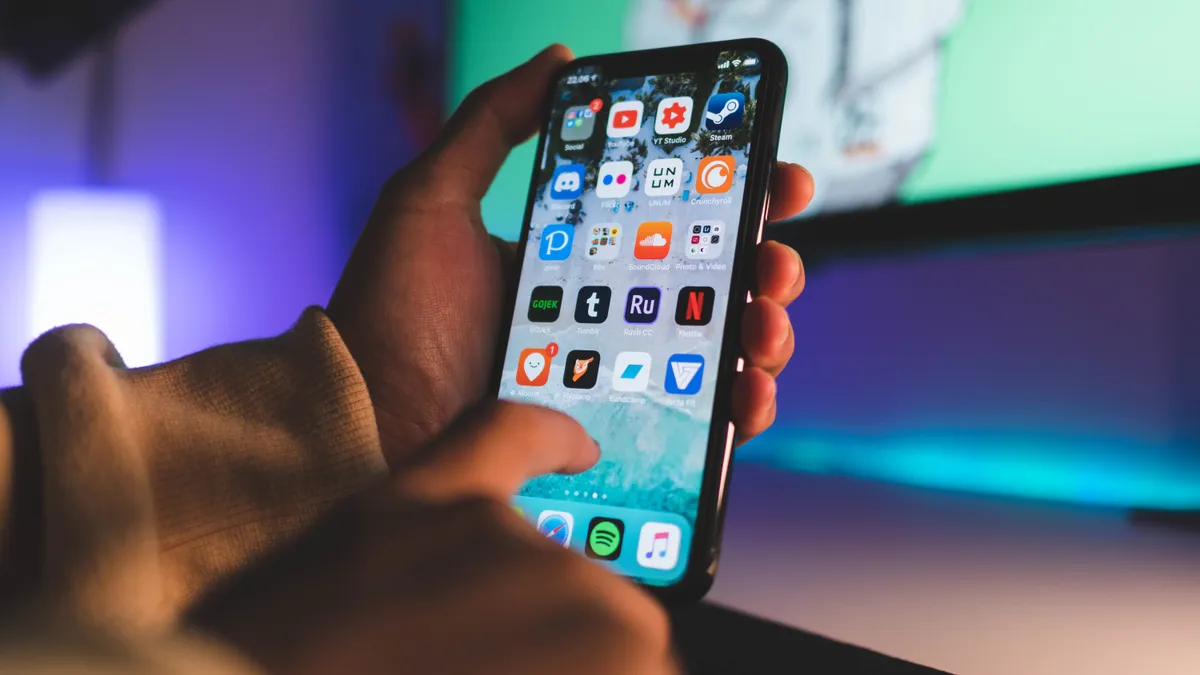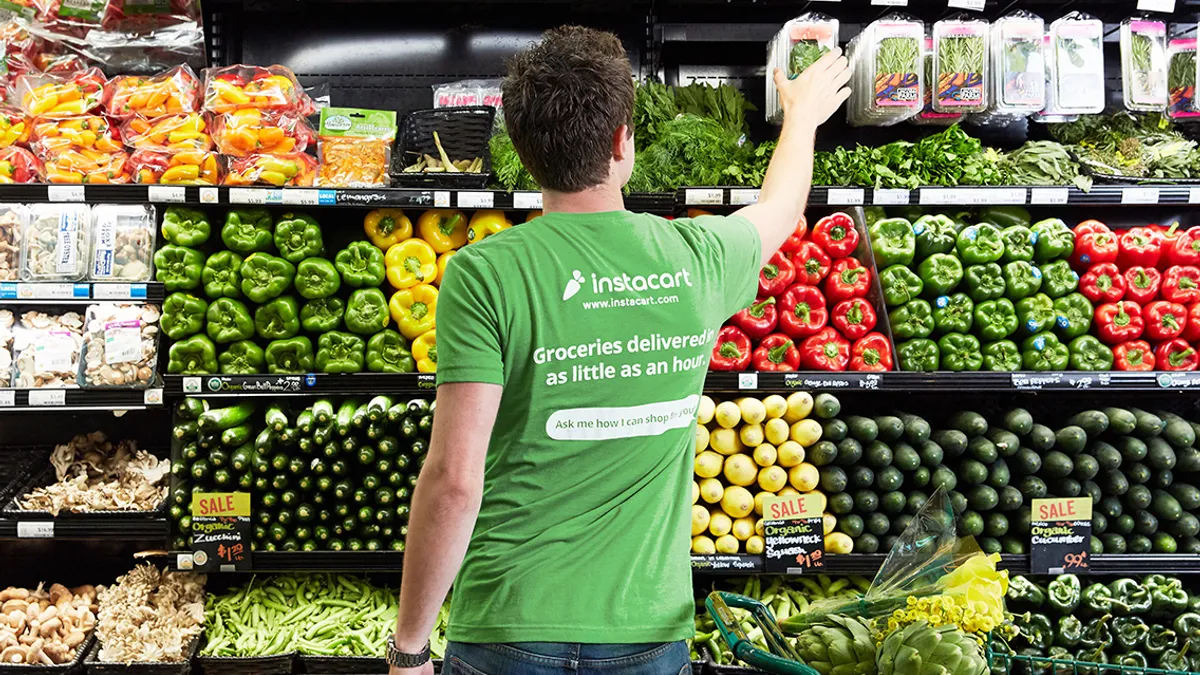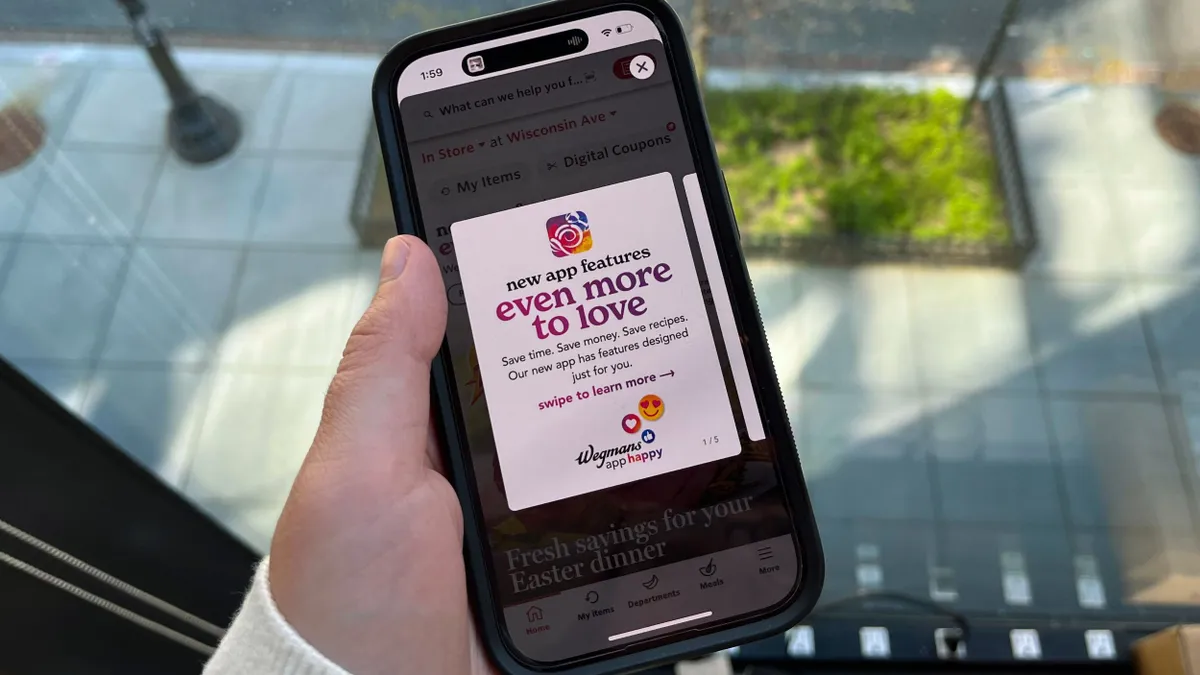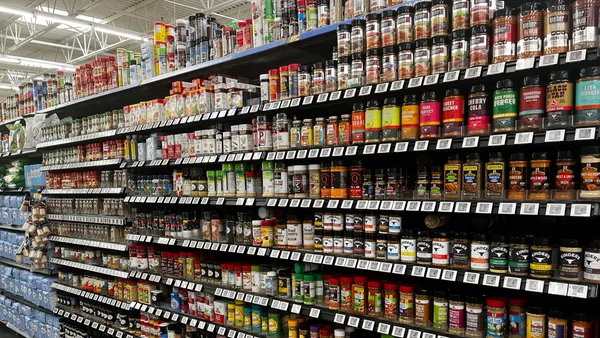LAS VEGAS — As consumers increasingly rely on their phones to discover as well as buy products, mobile commerce has evolved and ushered new companies into the food and beverage space. These players promise to challenge as well as aid retailers, who are themselves trying to boost mobile engagement with shoppers.
Pinterest, the discovery platform that counts 300 million monthly active users of which 80% are mobile users, currently sells ads to CPG companies like Kraft Heinz and PepsiCo that appear in users' feeds and feature buy tools, recipe pages and other features. This makes the company a competitor for trade dollars coming from packaged goods companies, but during a presentation at Groceryshop on Tuesday, Arthur Sevilla, Pinterest's head of CPG strategy, said the ads promote discovery in retailers’ store aisles and online.
According to a consumer panel of 9 million compiled by Oracle Data Cloud, Pinterest households were 29% more likely to try new products over a 10-month period that included 40 CPG product launches. Pinterest's research also finds that 55% of weekly users utilize the app while shopping in-store.
"That's not scrolling through my feed while waiting for the checkout line," Sevilla said during his presentation. "That is actively shopping and using the platform as a utility to make choices in a highly relevant and contextual matter."
Pinterest's shoppable CPG ads link to retailers like Target and Walmart. And the company has increased its shoppable content in categories like home goods and fashion, with 2.5 billion items now able to be identified through its Lens feature and linked to a buy page.
The company currently doesn't offer shoppable recipes that link to retailer e-commerce platforms, but given its evolution, focus on food inspiration and the proliferation of shoppable ingredients across digital platforms in recent years, the move would seem to be a logical next step. In an interview with Grocery Dive, Sevilla said the company is interested in exploring shoppable recipes, but wouldn't say if it's in talks with retailers.
"We're committed to learning and understanding what their goals are and what our goals are," he said.
Pinterest has staffed up with food retail veterans of late. In addition to Sevilla, whom the company poached from Mondelez back in 2017, Pinterest earlier this year hired Jeremy King, Walmart's former chief technology officer, as its head of engineering.
Iris Nova expands
Unlike Pinterest, which began primarily as an image-sharing app that has evolved to leverage mobile commerce, selling CPG products was always a core strategy at Iris Nova, the beverage platform fueled by a $15 million investment from Coca-Cola. The company plans to spend $100 million creating a stable of million-dollar beverage brands that sell to consumers via text messaging. The direct-to-consumer company has so far sold more than two million bottles of its Dirty Lemon beverage brand this way. The premium drinks, which include wellness-focused flavors like chromium and matcha, sell for around $10 each.
On Tuesday, Iris Nova CEO Zak Normandin announced the first four independent beverage brands it's bringing onto the platform: Minna, a lightly brewed sparkling tea; Halo Sport, a sport hydration drink; Sanzo, an Asian-inspired sparkling water; and Vina, an apple cider vinegar spritz. Each drink contains no added sugar and prices range from $2.50 for a can of Minna to $42 for a case of Halo Sport with 12 bottles.
In addition to promotion through Iris Nova, the new brands also have access to pooled customer data through the company's text-to-order system, meaning shoppers don't have to reenter payment information for each new brand they buy. Shoppers message their product request to a number linked to each brand, and either a chatbot or a live customer representative guides them through their order. Normandin said the chatbot handles roughly 50% of orders — typically those that are less complex in nature, like re-orders.
Consumers have shown a willingness to purchase products in other ways beyond the traditional click-to-cart method. Conversational commerce, the interactive trend Iris Nova counts itself a part of, and which includes voice ordering through devices like Amazon Alexa, accounted for more than $2 billion in e-commerce sales last year, according to eMarketer.
Iris Nova has linked that mobile commerce pathway to a speedy fulfillment system, with same- or next-day delivery coming from seven fulfillment centers across the U.S.
"We believe that in the future every brand is going to have a phone number and a website. The website is going to be for looking at pretty pictures of products, and the phone number is going to be where consumers go to transact and to ask customer service questions," Normandin said during his presentation at Groceryshop.
The company also operates The Drug Store, small brick-and-mortar locations that feature the company's beverage brands as well as a custom cocktail bar. There are two New York City locations currently, with two more due early next year.
Grocery app usage rising
Retailers are also trying to promote discovery and payment innovation across their mobile apps. Last year, BJ's Wholesale Club launched a new app that lets customers place orders for delivery or store pickup, check the status of their loyalty points and access digital coupons. Similarly, SpartanNash rolled out an all-in-one app for its major retail banners that included e-commerce and rewards integration.
As the number of mobile shoppers increases, retailers are under pressure to refine their apps and add more bells and whistles. According to eMarketer, the number of U.S. grocery app users is set to grow from 22.6 million users this year to 30.4 million by 2022.
"If you're going to build a mobile app ... it's got to be more than just traditional e-commerce. It's got to provide something more for the consumer," Brendan Miller, a principal analyst with Forrester told Grocery Dive in an interview.
Correction: A previous version of this story misstated the lowest-priced beverage in Iris Nova's new brand lineup. Cans of Minna sparkling tea are $2.50 each.





















